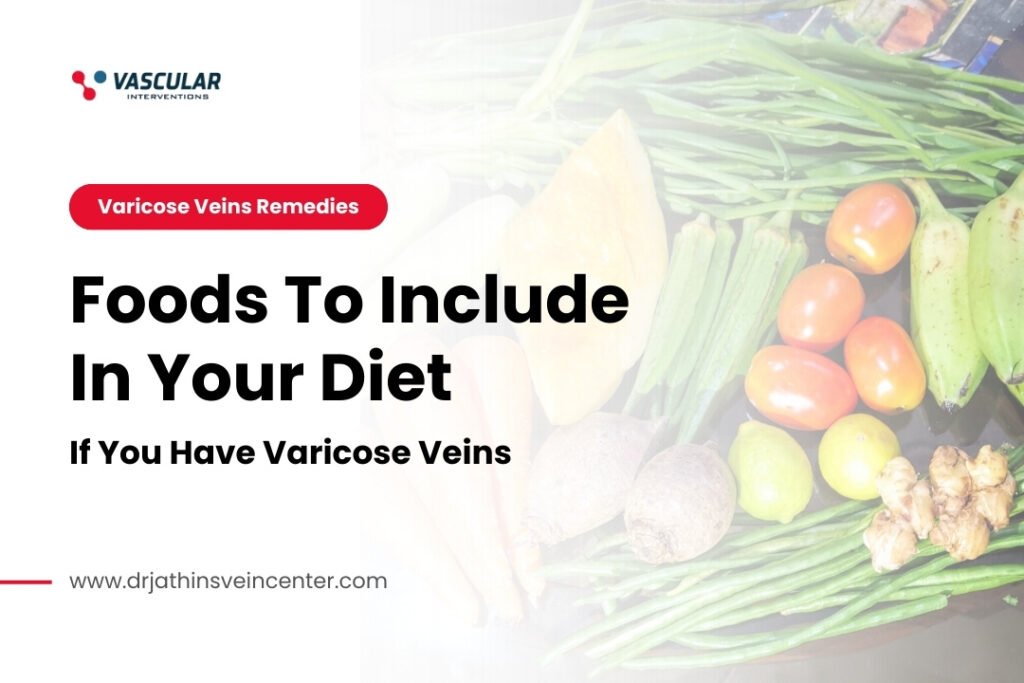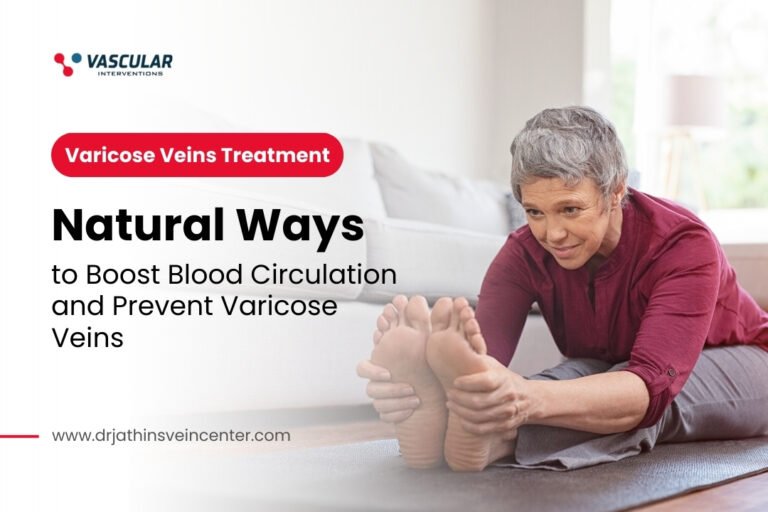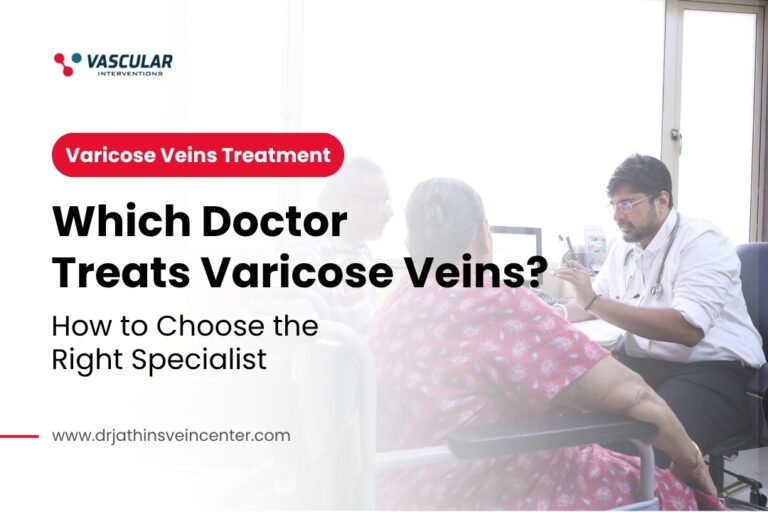Do you have varicose veins and want to know how your diet can help?
Varicose veins, those pesky, bulging veins that often show up on your legs, can cause discomfort and even pain. While medical treatments can make a big difference, what you eat can also help keep them in check.
There are many advanced treatments available for varicose veins, including laser varicose veins treatment, but don’t overlook the power of a good diet.
Eating the right foods can improve blood flow, reduce inflammation, and help you maintain a healthy weight, all of which are key for managing varicose veins effectively.
In this article, we’ll talk about the best foods to include in your diet if you have varicose veins. Let’s dive in and see how you can make a difference with the right foods.
Leafy Greens and Vegetables
Kale and Lettuce:
Kale and lettuce are full of vitamins C and K, which can help improve blood circulation and strengthen vein walls. Plus, their high fiber content keeps your digestion on track, which can prevent constipation and take some pressure off your veins.
Avocado:
Avocados are packed with healthy fats, vitamins C and E, and glutathione – a powerful antioxidant that can help keep your veins in good shape. Their anti-inflammatory properties also help reduce the discomfort of varicose veins while improving blood flow.
Asparagus:
Asparagus acts as a natural diuretic, which means it helps flush out extra fluid and reduce swelling in your legs. It’s also rich in vitamins B and C, which are important for keeping your veins strong and healthy.
Beets:
Beets contain nitrates that can improve blood flow by helping your blood vessels relax. They’re also full of antioxidants, which fight inflammation and support overall vein health.
Ginger:
Ginger’s anti-inflammatory properties can help relieve pain and improve circulation. It also helps break down fibrin, a protein that can make varicose veins more visible. Additionally, ginger has a moderate antiplatelet effect, which can can help keep your blood flowing smoothly.
If you love eating fruits or adding them to your meals, you’re in for a treat! Next, we’ll talk about some fruits that taste great and are also good for helping with varicose veins.
Fruits
Blueberries:
Blueberries are small but mighty. They’re packed with antioxidants like anthocyanins, which help strengthen your veins and improve blood flow.
Plus, they have anti-inflammatory properties that can reduce swelling and discomfort.
Citrus Fruits:
Oranges, lemons, and grapefruits are bursting with vitamin C, which is crucial for collagen production. Collagen helps keep your veins strong and flexible.
Plus, the bioflavonoids in citrus fruits can help improve circulation and reduce inflammation.
Strawberries:
Strawberries are loaded with vitamin C and antioxidants, making them great for boosting circulation and supporting vein health.
Their high fibre content can also aid digestion, easing the pressure on your veins.
Papaya:
Papayas are rich in vitamins C and E, which help support healthy veins. They also contain an enzyme called papain that reduces inflammation and improves circulation.
Now, let’s talk about how whole grains can help you keep varicose veins in check.
Whole Grains
Brown Rice:
Brown rice is a whole grain packed with fiber, which helps keep your digestion on track and eases pressure on your veins. Plus, it’s got magnesium to help relax blood vessels and promote good circulation.
Oats:
Oats are a fiber-rich option that can help you maintain a healthy weight while aiding digestion. They also have antioxidants that fight inflammation and support your vein health.
Whole Wheat:
Whole wheat is another fiber-packed grain that can prevent constipation and keep your veins happy. It’s also full of essential nutrients like iron and zinc, which help maintain healthy blood flow.
Now, let’s explore some nuts and seeds that are popular in Indian kitchens and can also help manage varicose veins.
Nuts and Seeds
Almonds:
Almonds are a powerhouse of nutrients, rich in vitamin E which helps maintain healthy blood vessels and improves elasticity. Eating a handful of almonds daily can boost your overall vein health.
Chia Seeds:
Chia seeds are loaded with omega-3 fatty acids that reduce inflammation and improve blood circulation. They’re easy to sprinkle on your favourite dishes, giving a nutritious boost that’s good for your veins.
Flaxseeds:
Flaxseeds are another fantastic source of omega-3s and fibre. They help in reducing inflammation and improving blood flow, which can alleviate the symptoms of varicose veins.
Now, if you enjoy sipping on different drinks after lunch or dinner, the next section will definitely catch your interest!
Beverages
Green Tea:
Green tea is packed with antioxidants that can strengthen your blood vessels and reduce inflammation. A few cups a day could help ease the symptoms of varicose veins.
Herbal Tea:
Herbal teas, such as chamomile or ginger tea, are excellent for improving circulation and reducing inflammation. They are calming and beneficial, especially if you’re looking to support vein health.
Water:
Staying well-hydrated with plain water is crucial for maintaining the health of your veins. Water keeps your blood flowing smoothly, which can prevent it from pooling in your veins.
Enjoying these beverages regularly can be a simple yet effective part of managing your varicose veins.
Additional Tips
Avoid Processed Foods:
Cut down on processed foods. They’re full of unhealthy fats and can make inflammation worse, which isn’t good for varicose veins.
Try to eat more natural and fresh foods instead.
Limit Salt and Sugar:
Eating too much salt can make your body hold on to water, putting extra pressure on your veins.
Too much sugar can make you gain weight, which also puts pressure on your legs.
Try to eat less salt and sugar to help ease your varicose vein symptoms.
Maintain a Healthy Weight:
Keeping at a healthy weight helps a lot. Extra weight can put more pressure on your veins and make varicose vein symptoms worse.
Regular exercise and eating right can keep your weight in check.
Consult a Doctor:
Diet and exercise are great, but if you’re really hurting or varicose veins are getting in the way of your daily life, it’s time to see a varicose veins doctor.
Dr. Jathin knows all about varicose vein treatments and can give you advice, medication, and other treatments to help you get back to feeling good.
Don’t wait if you’re in pain—getting the right help can get you back on your feet faster.
These tips should help you manage your varicose veins better. But, don’t rely only on them you must consult the varicose veins specialist before the situation worsens.
Conclusion
Managing varicose veins can be as much about the small, daily decisions as it is about medical treatments.
By choosing healthier foods, staying active, and keeping an eye on your weight, you’re taking important steps toward reducing the discomfort and appearance of varicose veins.
Remember, incorporating good food & good habits into your daily lifestyle can also contribute significantly to your vein health.
However, when lifestyle changes aren’t enough to alleviate your symptoms, it’s crucial to seek professional advice. Dr. Jathin, with his extensive experience in varicose vein treatments, can offer you the guidance and care needed to manage your condition effectively. Don’t hesitate to reach out for help if your varicose veins are affecting your quality of life.
We hope this guide has provided you with valuable insights on how to manage and potentially reduce varicose vein symptoms through diet and lifestyle.
Keep these tips in mind, and take proactive steps towards a healthier, more comfortable life.
If you have any questions or need expert care, You can easily book an appointment with Dr. Jathin online.





